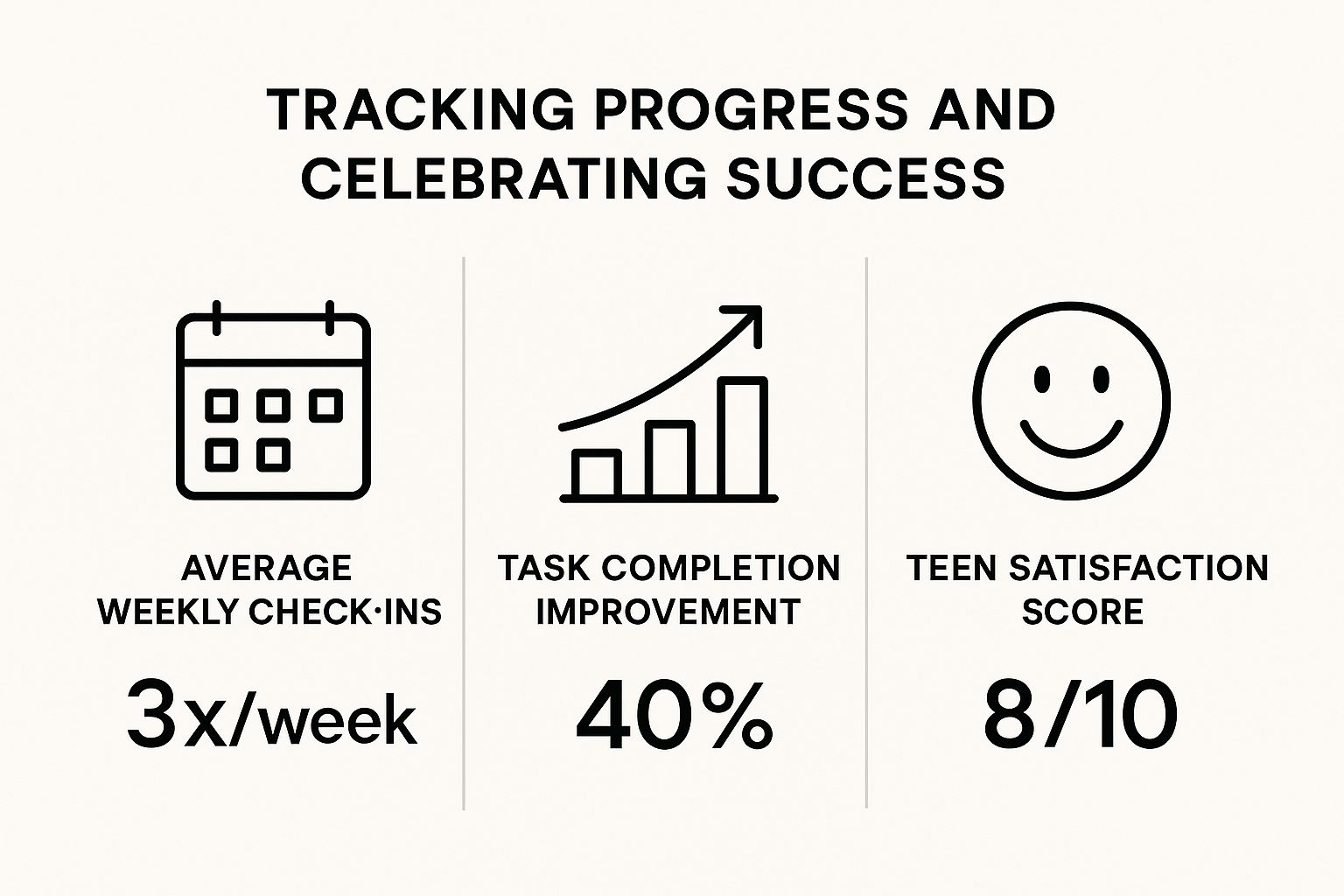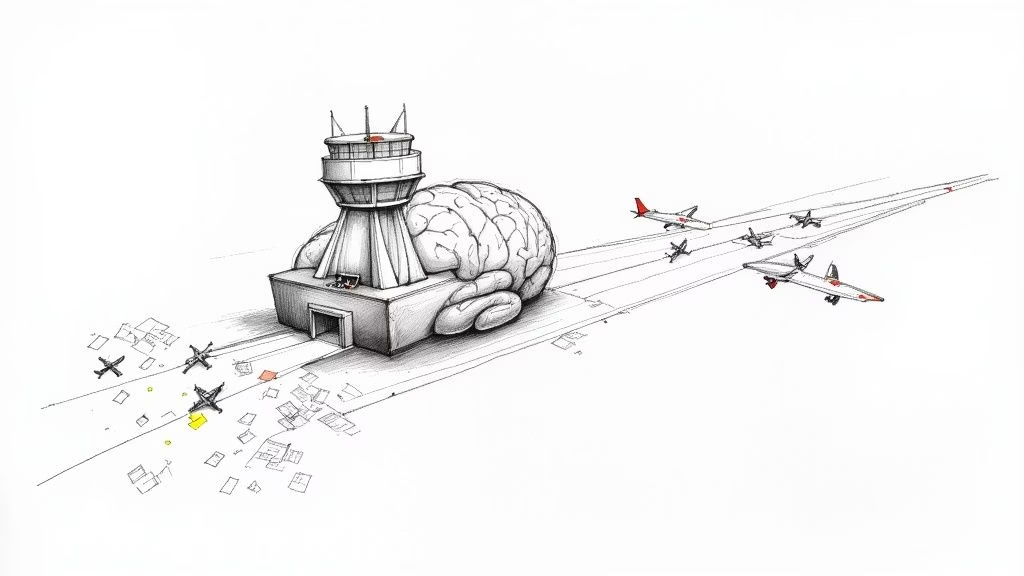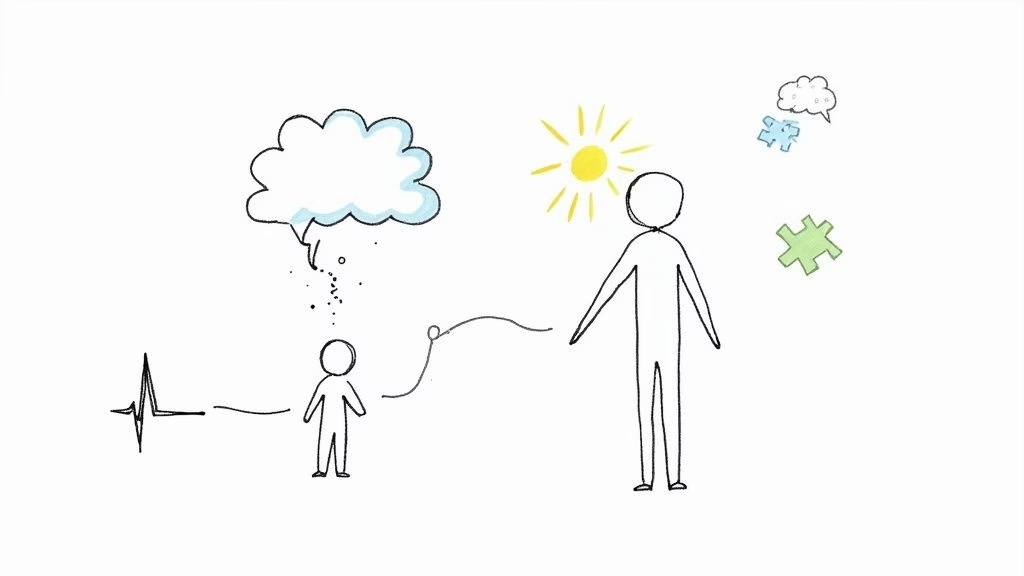Trying to figure out how to motivate a teenager can feel like you’re solving an impossible puzzle. I’ve been there, both as a teen who struggled and as a coach who now helps parents and teens navigate this. The real key is to shift your perspective. Stop trying to make them do things and start understanding why they aren’t.
This means moving beyond labels like "lazy" and digging into what’s really going on. It's almost always a mix of developmental, social, and psychological factors. This guide offers practical parenting tips and resources to help you understand the root causes of apathy and foster genuine, lasting motivation in your teen, especially concerning school and procrastination.
Why Your Teenager Seems So Unmotivated
It’s one of the most common frustrations I hear from parents: a once-energetic kid now seems completely apathetic about school, chores, and their future. This isn't laziness. More often than not, it’s a symptom of much deeper issues tied to the wild ride of adolescent development and the immense pressures teens face today.
To build motivational strategies that actually work, we have to get inside their world. What you see as apathy is often a complex cocktail of brain science, social anxiety, and academic stress.
The Developing Teenage Brain
A huge piece of this puzzle is the teenage brain itself—it's still under construction. The prefrontal cortex, which is like the brain's CEO in charge of planning, impulse control, and thinking about long-term consequences, isn't fully wired up yet.
At the same time, the limbic system, the part that drives emotions and craves rewards, is firing on all cylinders. This biological mismatch means teens are hardwired to chase immediate rewards (like one more level in a video game or a text from a friend) over long-term goals (like studying for a final exam that’s weeks away).
This isn't a character flaw; it's just biology. When your teen procrastinates on a massive school project, it’s not necessarily defiance. It’s their brain's natural pull toward something that offers an instant dopamine hit instead of a difficult, non-pleasurable task.
Parenting Tip: A teenager's resistance to long-term planning isn't laziness. It's often a direct result of their brain development, which favors immediate gratification over delayed, abstract rewards like good grades. Patience and structure are your best tools here.
The Weight of School and Social Pressure
Let's be honest: today's teens are navigating a world of intense academic and social expectations. The pressure to get perfect grades, stack up extracurriculars, and build a flawless college application can be absolutely crushing.
When faced with this mountain of expectations, some teens just shut down. This shutdown, which looks a lot like a lack of motivation, is actually an emotional self-preservation tactic. They feel completely overwhelmed. A lack of motivation for school can stem directly from this academic anxiety, leading to a cycle of procrastination where avoiding schoolwork feels less stressful than facing it.
This is often linked to mental health challenges like anxiety and depression, which can show up as lethargy, irritability, and a loss of interest in things they used to love. Research shows a strong link between academic stress and teen mental health, so we can't ignore these factors.
Piling more pressure onto a teen who is already drowning will only make them retreat further into procrastination and apathy. The first step is to acknowledge their stress. That’s how you start rebuilding connection and, eventually, motivation.
Connecting Their Passions to Their Responsibilities

Let’s be honest. For a lot of teenagers, school feels like a pointless checklist. It's a series of abstract tasks that have absolutely zero connection to their real lives. This is a huge reason why even the brightest kids end up procrastinating or just completely checking out.
If you really want to motivate a teenager, you have to stop chasing the grades and start building a bridge—one that connects what they have to do with what they actually love to do.
It starts with getting genuinely curious. This means kicking off low-pressure conversations that aren't secretly about their five-year plan or that looming college essay. Ask them about the video game they’re obsessed with, the music they have on repeat, or the YouTube channel they can’t stop watching. Your only job here is to listen and understand what lights them up, without a hint of judgment.
Once you have a real sense of their passions, you can start to gently connect the dots back to their schoolwork. The goal is to show them how school can be a toolkit for the future they actually want, not just some obstacle standing in their way.
Translating Hobbies into Real-World Skills
The real magic happens when you help them reframe their responsibilities. Instead of seeing school as a chore, help them see it as a training ground for skills they already use and value in their hobbies. This simple shift in perspective can change everything.
Here’s what this looks like in the real world:
- For the Gamer: Their love for video games is so much more than just a way to kill time. Talk about the incredible storytelling in their favorite RPG—that’s a direct link to English and creative writing. Discuss the complex problem-solving and strategy involved, which are the same skills they use in math and science. You can even point out how game developers use coding and physics to build those amazing worlds.
- For the Social Justice Advocate: If your teen is fired up about making a difference, history class is no longer about memorizing dates. It becomes the study of how real movements for change were built. Debate club is a place to sharpen their arguments, and English class is where they learn to write essays that persuade people and make a real case.
- For the Aspiring Creator: Does your teen spend hours making TikToks or designing graphics? They're already practicing project management, audience analysis, and creative execution. These are seriously valuable skills that connect directly to media studies, marketing, and visual arts.
Parenting Tip: This isn't about forcing them down a specific career path. It's about showing them that school subjects give them the foundational skills to get really, really good at anything they're passionate about. It makes learning relevant.
Aligning Ambition with Action
What’s interesting is that research shows teenage career ambitions are actually on the rise. A recent study found that the number of 15-year-olds aiming for professional careers—in fields like science, engineering, and healthcare—shot up from 47% in 2000 to 58% in 2022.
But here’s the problem: there’s often a huge gap between those big dreams and their day-to-day school life, especially for kids who don't see a clear path forward. This is exactly why it’s so critical to help them connect today’s homework to tomorrow’s goals. You can read more about this in the Teacher Magazine report on teen career expectations.
When you show them how algebra could help them build an app or how history lessons can inform their activism, you give them a powerful "why" behind their work. That simple connection can be the key to breaking through procrastination and reigniting their drive from the inside out.
Parenting Strategies That Foster Internal Drive

Let's be honest: true, lasting motivation can't be forced with rewards or threats. It has to come from within. If you want to know how to motivate your teen for the long haul, the mission is to shift from being their life's manager to a consultant they actually trust.
This means creating an environment where their own internal drive can finally surface and grow. We're talking about fostering intrinsic motivation—that desire to do something because it feels personally rewarding, not because you’re dangling a carrot or threatening a punishment. This whole shift starts with one key ingredient: autonomy.
Give Them Genuine Control
When teens feel micromanaged, one of two things usually happens. They either rebel, or they become completely passive, waiting for you to tell them what to do next. The antidote is to give them genuine control over age-appropriate parts of their lives.
Let them have a real say in their own schedules, projects, and choices. This doesn’t mean no rules; it means you collaborate on them. Instead of dictating their homework schedule, try asking, "What’s your game plan for getting that history project done by Friday?" That simple switch in language hands the ownership over to them.
By giving your teen autonomy, you're doing more than just backing off. You're sending a powerful message: "I trust your judgment." This trust is the very foundation on which their self-confidence and motivation are built.
This approach helps them feel competent and in control—two things absolutely essential for developing drive. The focus moves from mere compliance to real personal responsibility.
Shift from Lecturing to Problem-Solving
Lectures are a one-way street, and with a teenager, that street almost always leads to a dead end. They tune out, the power struggle ramps up, and nobody wins. Collaborative problem-solving, on the other hand, invites them into a conversation as an equal partner.
So, next time a problem comes up, like procrastination on a big assignment, try this approach instead:
- State what you see, without judgment: "I noticed you haven't started your math homework yet, and the test is on Thursday."
- Ask an open-ended question: "What's getting in the way?" or "How are you feeling about this test?"
- Actually listen to their answer: They might be overwhelmed, totally confused by the material, or just plain scared of failing.
- Work on a solution together: "Okay, that makes sense. What's one small step you could take right now to feel a little less overwhelmed?"
This technique completely transforms you from an adversary into an ally. It also teaches your teen how to solve their own problems and bounce back from setbacks. Helping your teen build this kind of inner strength is crucial, and you can explore more strategies for building resilience in teens in our detailed guide.
Praise the Effort, Not Just the Outcome
Our culture loves to celebrate the 'A' on the report card. But for a teen who is really struggling with motivation, that final grade can feel impossibly out of reach. This is where praising their effort becomes a total game-changer.
Focusing on the process—the work itself—teaches them that their hard work is valuable, no matter what the final score is.
Celebrate the small wins. Did they study for 30 minutes without getting distracted? Acknowledge it. Did they finally ask a teacher for help? Praise that initiative. This creates a home where it’s safe to try, fail, and try again—which is the very essence of learning and growing.
Helping Your Teen Tackle Procrastination
Procrastination is one of the biggest walls you’ll hit when trying to motivate a teenager. But here’s something most people get wrong: it’s almost never about laziness. It’s an emotional reflex. That massive research paper or looming final exam feels like an impossible mountain to climb, so it becomes easier to just… not start. It’s a response to feeling overwhelmed, anxious, or just plain terrified of failure.
The key is to help your teen break this cycle with concrete tools, not lectures. By giving them practical, teen-friendly techniques, you empower them to manage their time and emotions. These are skills they’ll carry with them for the rest of their lives.
Breaking Down the Overwhelm
A huge project is intimidating for anyone, but especially for a teen whose brain is still developing its planning and executive function skills. The best thing you can do is help them break big, scary tasks into small, non-threatening steps.
This process builds its own momentum. Completing one tiny step creates a little win, a small sense of accomplishment that provides the emotional fuel to tackle the next one. This shifts their internal monologue from "I can't do this" to "Hey, I just did that."
Here are two simple but incredibly effective methods that work wonders for teens:
- The Pomodoro Technique: This is a game-changer. You work in focused, 25-minute bursts, followed by a 5-minute break. After four of these "pomodoros," you take a longer break. It makes starting feel less daunting because it’s only for a short, defined period. Anyone can do something for 25 minutes.
- Task Batching: Instead of a vague goal like "study for history," you group similar small tasks together. For example, they could batch tasks like "read one chapter," "make flashcards for key dates," and "review class notes from Monday." This creates a clear, actionable plan that feels manageable.
If you want to dive deeper into this, we have a whole guide on how to stop procrastinating.
Tracking these small wins makes a huge difference. In fact, we've seen a 40% improvement in task completion just by making progress visible and celebrating it.

The data here is pretty clear. With consistent, supportive check-ins, teens don't just get more work done—they also feel significantly better about the process itself.
Shifting from Critic to Coach
How you react when your teen procrastinates can either pour fuel on the fire or empower them to solve the problem. Moving from a critical or punishing stance to a supportive, coaching role is absolutely essential. Your reaction sets the emotional tone and can make them feel either attacked or understood.
Procrastination is often a symptom of underlying anxiety or a fear of not being good enough. A coaching response validates their feelings while guiding them toward a solution. A critical response just confirms their worst fears and reinforces the need to avoid the task.
The way you approach this can make all the difference. One path leads to conflict and shutdown, while the other builds trust and real problem-solving skills. Take a look at these common scenarios.
Procrastination Support Strategies
| Common Unhelpful Reaction | Effective Coaching Alternative |
|---|---|
| "Why haven't you started yet? You're just being lazy!" | "This project seems really big. What's the smallest first step you could take to just get started?" |
| "You'll be grounded until this is done." | "I get that it's tough to get motivated. Let's try working for just 15 minutes, then we can take a break. How does that sound?" |
| "You always leave things until the last minute." | "I've noticed this project is stressing you out. Is there anything I can do to help you break it down?" |
| Ignoring it, hoping they'll figure it out on their own. | "Let's make a plan together. What part feels the most overwhelming right now?" |
See the difference? The reactions on the left corner them, making them defensive. The alternatives on the right open a door for conversation and collaboration, turning you into an ally instead of an adversary.
When Lack of Motivation Signals a Deeper Issue

Procrastination and a bit of apathy are pretty much standard issue for teenagers. We’ve all been there. But as a parent or coach, it’s absolutely vital to know when you're looking at typical teen behavior versus red flags for a more serious mental health challenge.
When that disinterest becomes persistent and seems to swallow everything else, it’s time to pay closer attention. A temporary bad mood is one thing. A constant, low-grade gloom that drains the energy from your kid—and your entire home—is something else entirely.
Distinguishing Apathy from Underlying Issues
Typical teen disinterest is often specific. They might drag their feet on history homework but light up when their friends call or they get to play video games. I see it all the time.
But when a lack of motivation is tied to an issue like depression or anxiety, it tends to be pervasive. This is when you see a total loss of interest in hobbies and activities they once loved. It’s a shutdown that goes beyond one or two areas of their life.
Pay attention to these potential red flags:
- Significant changes in sleep or eating: Is your teen suddenly sleeping all day? Struggling with insomnia? Have you noticed a dramatic shift in their appetite, either eating way more or way less?
- Social withdrawal: Have they started pulling away from their friends? Are they consistently avoiding social events they used to look forward to?
- Persistent low mood or irritability: Does a cloud of sadness, hopelessness, or even anger seem to follow them everywhere they go?
- A drop in personal hygiene: A sudden lack of care for their appearance can be a surprisingly strong indicator that something deeper is wrong.
This disengagement isn't just about school; it often extends to their future. A recent global OECD report found that 39% of teens are unclear about their career expectations after high school. This uncertainty can fuel a massive amount of anxiety, leading them to disengage and shut down. You can read more about why teens are so unsure about their careers.
How to Seek Help and Support
If you recognize these signs in your teen, it's crucial to act. This isn't about blaming or "fixing" them; it's about giving them the support they need to navigate a real health challenge. The first step is to start a conversation without stigma, approaching them with empathy, not accusation.
Try saying something like, "I've noticed you haven't seemed like yourself lately, and I'm worried about you. I love you, and I'm here to listen if you ever want to talk." This opens the door for communication without adding pressure.
You don't have to have all the answers. Your role is to connect them with professionals who do. For more strategies on how to have these conversations, our guide on empowering parents with coaching tools for teen engagement can provide additional support.
Trusted Mental Health Resources for Teens:
- The Jed Foundation (JED): Provides essential resources for teens and young adults on mental health and suicide prevention.
- National Institute of Mental Health (NIMH): Offers detailed, research-backed information on a wide range of mental health conditions affecting adolescents.
- The Trevor Project: Offers crisis support and mental health resources for LGBTQ young people.
- Your Pediatrician or Family Doctor: They are an excellent first point of contact and can provide referrals to mental health specialists.
Reaching out to a professional is a sign of strength. It shows your teen that their well-being is the top priority and that it's always okay to ask for help.
Questions Parents Ask About Teen Motivation
Even with the best strategies, you're going to hit roadblocks. It’s one thing to have a game plan, but it's another to be in the middle of a tough moment with your teen. That's completely normal.
Here are some of the most common questions I get from parents, along with practical advice for those real-world situations.
Should I Pay My Teenager for Good Grades?
This one comes up a lot. It feels like a quick fix, but paying for grades can seriously backfire. When you tie money to an "A," you risk teaching your teen that learning is just a transaction. The real goal—fostering a genuine curiosity and love for learning—gets lost in the process.
Instead of paying for the grade, reward the effort. Acknowledge how hard they worked on that history paper or how they stuck with a math concept that was tripping them up. That's how you build intrinsic motivation—the kind that lasts a lifetime.
What if My Teen Says “I Don’t Care” About School?
Hearing "I don't care" is tough, but it's almost always a shield. It's a defense mechanism teens use when they feel overwhelmed, anxious, or terrified of failing. If you challenge it head-on, they’ll just dig their heels in deeper.
Try to get underneath the words. Respond with something like, "It sounds like you're feeling really frustrated with school right now." This simple shift validates their feelings and can open the door to a real conversation. You're showing them you're on their side, ready to listen.
This is a game-changer. When you shift from reacting to their words to acknowledging the emotion behind them, you move from conflict to connection.
How Do I Motivate My Teen Without Nagging?
Nagging happens when you're stuck in the role of manager, constantly sending reminders and creating friction. The key is to shift from being a manager to being a coach. A coach is a supportive ally, not an enforcer.
- Schedule a weekly check-in: Set aside a specific, low-stress time to talk about what’s on their plate, what's working, and where they might need support.
- Use collaborative language: Instead of "Did you do your homework?" try asking, "What's your plan for getting that project done?" or "How can I support you this week?"
This approach doesn't just get things done; it builds their sense of autonomy and shows you trust them. That trust is one of the most powerful motivators you have.
What If My Teen Has No Idea What They Want to Do?
This is incredibly common. For a lot of teens, not knowing what they want to do after high school is a huge source of anxiety, and it often leads to procrastination. They feel lost because they haven't been exposed to enough real-world possibilities. The research backs this up—globally, teens aren't getting enough career guidance. In the U.S., only about 20% of students report ever talking to a career adviser outside of their school. You can find more on this in a compelling report about teens feeling lost after high school on The 74 Million.
Your job isn't to have the answers, but to help them explore. Encourage them to volunteer, shadow a family friend for a day, or find a summer program in a field that piques their curiosity. The goal isn't to lock in a career path at 16, but to connect them with real experiences that might spark an interest and give them a sense of direction.
If you're looking for personalized strategies to help your teen move from feeling stuck to feeling empowered, Andrew Petrillo Life Coaching can help. We provide one-on-one support to help teens build the confidence, skills, and motivation they need to succeed in school and beyond. Learn more at https://andrewpetrillolifecoaching.com.



















